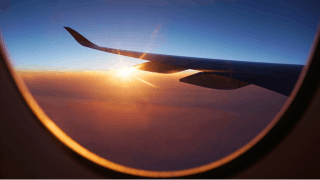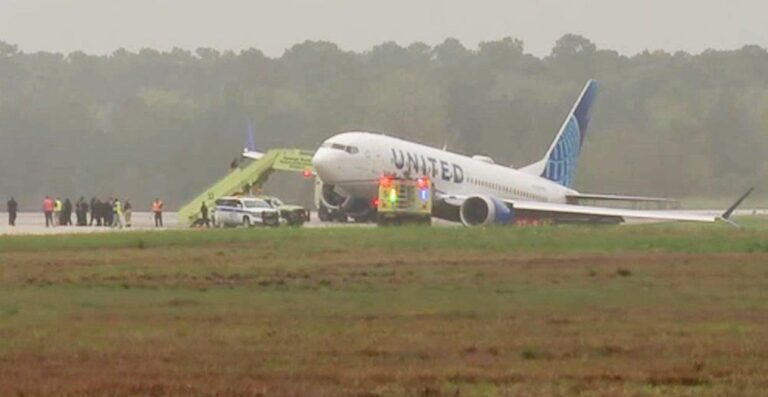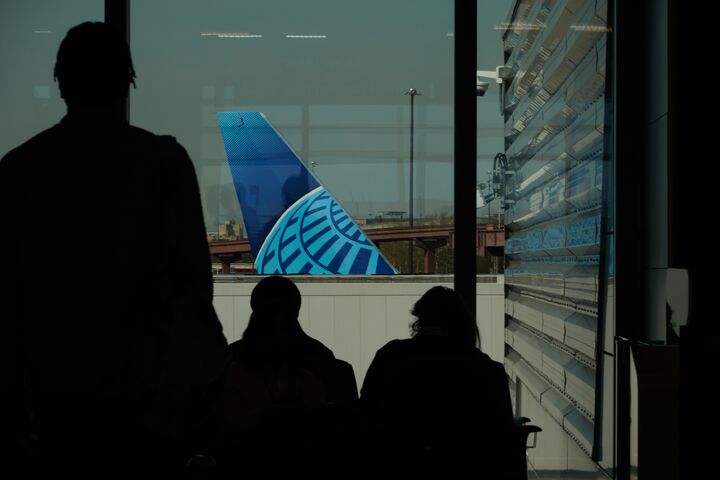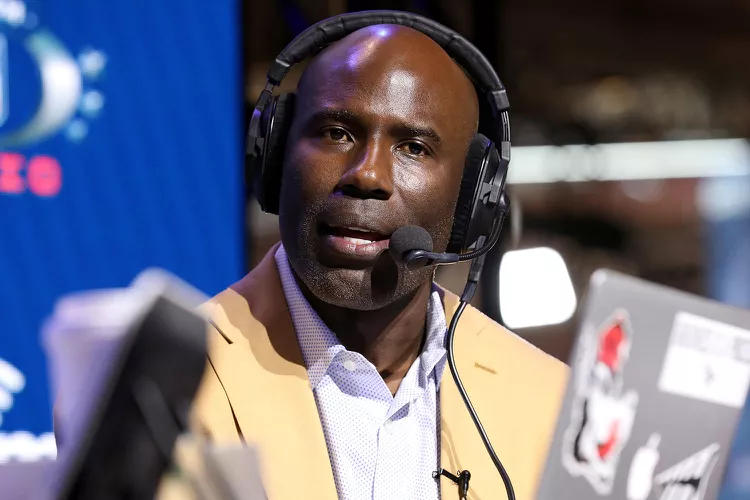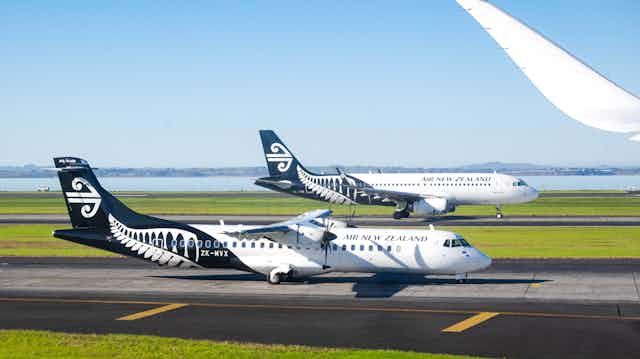United Airlines says it saw capacity glut coming, and prepared for it
The airline earned $1.3 billion, or $3.96 a share, in the second quarter, compared with $1.08 billion, or $3.24 a share, in the year-ago period.
Adjusted for one-time items, the airline earned $4.14 a share, above FactSet consensus of $3.93 a share.Revenue rose 6% to $15 billion, slightly below the $15.04 billion analysts were expecting.
It guided for adjusted per-share earnings between $2.75 and $3.25 for the third quarter, whereas analysts surveyed by FactSet expect adjusted EPS of $3.38. It kept its 2024 adjusted EPS guidance of between $9 and $11.
United can rely on revenue from its premium seating and basic economy seating as well as its market share among “domestic road warriors,” it said.
“Looking forward, we see multiple airlines have begun to cancel loss-making capacity, and we expect leading-unit revenue performance among our largest peers in the second half of the third quarter,” Chief Executive Scott Kirby said in a statement.
“United has long been preparing for the moment when industry-wide domestic capacity would adjust — it’s now clear that inflection point is just 30 days away,” Kirby said.
United has scheduled a conference call with analysts for Thursday at 10:30 a.m. Eastern.
Delta Air Lines Inc. DAL last week reported a weaker-than-expected outlook for its third quarter. Chief Executive Ed Bastian said at the time that as travel demand remained at record levels, growth in domestic seat supply has also accelerated, weighing on profitability per passenger.
“United’s expectations for a mid-August inflection point for the industry are similar to Delta’s comments about September strength,” Citi’s Trent said.
And Spirit Airlines Inc. SAVE on Tuesday guided for lower-than-expected second-quarter revenue mostly due to “incremental pressure” on non-ticket items.
The airline earned $1.3 billion, or $3.96 a share, in the second quarter, compared with $1.08 billion, or $3.24 a share, in the year-ago period.
Adjusted for one-time items, the airline earned $4.14 a share, above FactSet consensus of $3.93 a share.Revenue rose 6% to $15 billion, slightly below the $15.04 billion analysts were expecting.
It guided for adjusted per-share earnings between $2.75 and $3.25 for the third quarter, whereas analysts surveyed by FactSet expect adjusted EPS of $3.38. It kept its 2024 adjusted EPS guidance of between $9 and $11.
United can rely on revenue from its premium seating and basic economy seating as well as its market share among “domestic road warriors,” it said.
“Looking forward, we see multiple airlines have begun to cancel loss-making capacity, and we expect leading-unit revenue performance among our largest peers in the second half of the third quarter,” Chief Executive Scott Kirby said in a statement.
“United has long been preparing for the moment when industry-wide domestic capacity would adjust — it’s now clear that inflection point is just 30 days away,” Kirby said.
United has scheduled a conference call with analysts for Thursday at 10:30 a.m. Eastern.
Delta Air Lines Inc. DAL last week reported a weaker-than-expected outlook for its third quarter. Chief Executive Ed Bastian said at the time that as travel demand remained at record levels, growth in domestic seat supply has also accelerated, weighing on profitability per passenger.
“United’s expectations for a mid-August inflection point for the industry are similar to Delta’s comments about September strength,” Citi’s Trent said.
And Spirit Airlines Inc. SAVE on Tuesday guided for lower-than-expected second-quarter revenue mostly due to “incremental pressure” on non-ticket items.
The airline earned $1.3 billion, or $3.96 a share, in the second quarter, compared with $1.08 billion, or $3.24 a share, in the year-ago period.
Adjusted for one-time items, the airline earned $4.14 a share, above FactSet consensus of $3.93 a share.Revenue rose 6% to $15 billion, slightly below the $15.04 billion analysts were expecting.
It guided for adjusted per-share earnings between $2.75 and $3.25 for the third quarter, whereas analysts surveyed by FactSet expect adjusted EPS of $3.38. It kept its 2024 adjusted EPS guidance of between $9 and $11.
United can rely on revenue from its premium seating and basic economy seating as well as its market share among “domestic road warriors,” it said.
“Looking forward, we see multiple airlines have begun to cancel loss-making capacity, and we expect leading-unit revenue performance among our largest peers in the second half of the third quarter,” Chief Executive Scott Kirby said in a statement.
“United has long been preparing for the moment when industry-wide domestic capacity would adjust — it’s now clear that inflection point is just 30 days away,” Kirby said.
United has scheduled a conference call with analysts for Thursday at 10:30 a.m. Eastern.
Delta Air Lines Inc. DAL last week reported a weaker-than-expected outlook for its third quarter. Chief Executive Ed Bastian said at the time that as travel demand remained at record levels, growth in domestic seat supply has also accelerated, weighing on profitability per passenger.
“United’s expectations for a mid-August inflection point for the industry are similar to Delta’s comments about September strength,” Citi’s Trent said.
And Spirit Airlines Inc. SAVE on Tuesday guided for lower-than-expected second-quarter revenue mostly due to “incremental pressure” on non-ticket items. The airline earned $1.3 billion, or $3.96 a share, in the second quarter, compared with $1.08 billion, or $3.24 a share, in the year-ago period.
Adjusted for one-time items, the airline earned $4.14 a share, above FactSet consensus of $3.93 a share.Revenue rose 6% to $15 billion, slightly below the $15.04 billion analysts were expecting.
It guided for adjusted per-share earnings between $2.75 and $3.25 for the third quarter, whereas analysts surveyed by FactSet expect adjusted EPS of $3.38. It kept its 2024 adjusted EPS guidance of between $9 and $11.
United can rely on revenue from its premium seating and basic economy seating as well as its market share among “domestic road warriors,” it said.
“Looking forward, we see multiple airlines have begun to cancel loss-making capacity, and we expect leading-unit revenue performance among our largest peers in the second half of the third quarter,” Chief Executive Scott Kirby said in a statement.
“United has long been preparing for the moment when industry-wide domestic capacity would adjust — it’s now clear that inflection point is just 30 days away,” Kirby said.
United has scheduled a conference call with analysts for Thursday at 10:30 a.m. Eastern.
Delta Air Lines Inc. DAL last week reported a weaker-than-expected outlook for its third quarter. Chief Executive Ed Bastian said at the time that as travel demand remained at record levels, growth in domestic seat supply has also accelerated, weighing on profitability per passenger.
“United’s expectations for a mid-August inflection point for the industry are similar to Delta’s comments about September strength,” Citi’s Trent said.
And Spirit Airlines Inc. SAVE on Tuesday guided for lower-than-expected second-quarter revenue mostly due to “incremental pressure” on non-ticket items. .

